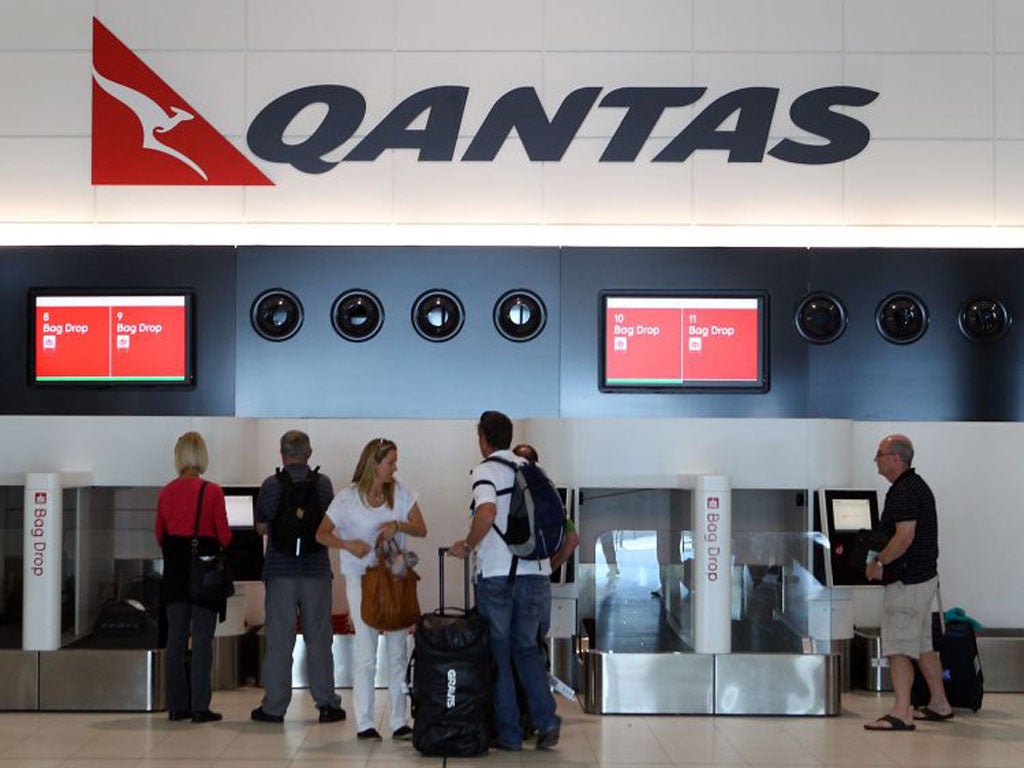Qantas to offset every passenger’s carbon emissions from ultra-long-haul London-Sydney flights
Airline boss reacts to ‘flight shame’ movement in Europe

Your support helps us to tell the story
From reproductive rights to climate change to Big Tech, The Independent is on the ground when the story is developing. Whether it's investigating the financials of Elon Musk's pro-Trump PAC or producing our latest documentary, 'The A Word', which shines a light on the American women fighting for reproductive rights, we know how important it is to parse out the facts from the messaging.
At such a critical moment in US history, we need reporters on the ground. Your donation allows us to keep sending journalists to speak to both sides of the story.
The Independent is trusted by Americans across the entire political spectrum. And unlike many other quality news outlets, we choose not to lock Americans out of our reporting and analysis with paywalls. We believe quality journalism should be available to everyone, paid for by those who can afford it.
Your support makes all the difference.Qantas has said it will offset every passenger’s carbon emissions from its new ultra-long-haul direct flights.
The “Project Sunrise” services will be the longest commercial flights in the world, clocking in at 18-20 hours, and flying nonstop between Sydney and Melbourne to key destinations including London, New York and Paris.
Now, the airline has said it will be offsetting the new services’ emissions on every seat filled, in response to the “flight shame” movement in Europe, which encourages travellers to swap flying for alternative, lower-carbon forms of transport.
“We've said we'll carbon offset every passenger on the aircraft because there’s a big push in Europe not to travel called flight-shaming, which is a big issue,” Qantas Group CEO Alan Joyce told The Australian Financial Review Business Summit.
Speaking of previous Project Sunrise test flights, on which journalists were invited to travel, Mr Joyce said that “the number one question from the European journalists was why would anyone do this with the carbon emissions we’re going to have on these flights”.
In response, Qantas will be offsetting the emissions of every passenger through projects including rebuilding wetlands and replanting endangered rainforest at Queensland's Babinda Reef.
However, environmental campaigners argue that offsetting does not mitigate the damage to the climate done by long-haul flights.
“Naming this scheme ‘Fly Carbon Neutral’ is misleading to say the least,” Emma Kemp, campaigns manager at climate charity Possible, tells The Independent. “There’s no magic technology that can instantly draw carbon out of the atmosphere and then store it safely, securely and indefinitely.
“Telling consumers that by offsetting they’ll be flying carbon neutral only fools people into thinking we can continue with business as usual. We cannot offset our way out of the climate crisis. Tackling emissions from aviation means bold policy change to encourage a shift away from frequent flying and switching to low carbon travel.”
Anna Hughes, director of Flight Free UK, agrees: “The trouble with offsetting is that it doesn’t actually remove the carbon that we are emitting today – it just promises that carbon might, at some point, be absorbed in the future, or mitigated elsewhere.
“We have no way of knowing if that will actually happen, and in the meantime, we are pumping CO2 directly into the upper atmosphere where it does the most damage. In addition, and much more problematically, offsetting makes us believe that our emissions don’t count, which gives us licence to continue our polluting behaviour.
“The uncomfortable reality is that the only way to fly carbon neutral is not to fly at all.”
The coronavirus pandemic has pushed back the anticipated launch of Project Sunrise flights until 2024.
“We still want to revisit it at the end of ’21, with the potential of doing it [introducing scheduled Project Sunrise flights] in ’24, probably, and onwards,” said Mr Joyce at EuroControl‘s Aviation StraightTalk Live in February.
He said the carrier was two weeks away from ordering the aircraft needed for the new services back in March last year before Covid-19 swept the globe.
The airline has put its initial order of up to 12 ultra-long Airbus A350-1000s, each fitted with an additional fuel tank, on hold.
But Mr Joyce has said that he thinks nonstop ultra-long haul travel will be even more popular post pandemic.
“People in the post-Covid world will want to fly direct, which I think makes the Project Sunrise business case even better than it was pre-Covid,” he said.



Join our commenting forum
Join thought-provoking conversations, follow other Independent readers and see their replies
Comments